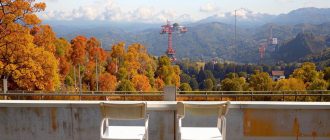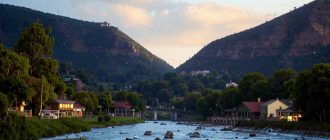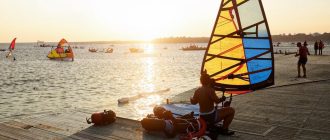
President of Pro-Vision, author of the Vinogradov.story community
“Walking, catching the fresh sea breeze, meeting sunsets and flirting with strangers – it’s as if waterfronts were created specifically to make our lives a little more pleasant. Rarely a city near the “big water” has not organized its own promenade – and each of them deserves a tourist’s attention. But some promenades over time have gained the status of real walking legends. I will tell you about them below.
Ipanema, Rio de Janeiro, Brazil
The “Girl from Ipanema,” sung in the bossa nova, often strolled along the promenade as well – at least that’s what the song says. The beach and promenade of Ipanema, one of Rio’s upscale neighborhoods, is a place where people dance samba, play soccer, sunbathe in the shallows and take millions of photos against the backdrop of Two Brothers Mountain.
Unlike its no less famous neighbor, Copacabana, the ocean swell is not so strongly felt here, and therefore it is a little more pleasant to swim in the water and walk along the promenade. In general, Ipanema seemed to me a little less pretentious – it seems that it prefers the world fame of its “big sister” to the opportunity to preserve its unique atmosphere.

Ipanema
Ortaköy, Istanbul, Turkey
There’s definitely no shortage of beautiful promenades in Istanbul, but Ortaköy is special in every sense. Firstly, it offers that “postcard” view of the Bosphorus, without which Istanbul would not be Istanbul. Secondly, here the Turkish flavor is manifested in all its diversity – mosaics are dazzling, fryers are smoking, and the air is full of the aroma of national sweets.
Here is also one of the most photographed places in Istanbul – Ortaköy Mosque, which looks like a luxurious baroque palace. Finally, it is from the waterfront that residents and visitors cross the Bosphorus – hence, traveling from Europe to Asia. Those who collect such symbolic moments are sure to be pleased.

Ortaköy
Riva degli Schiavoni, Venice, Italy
Despite the fact that Venice stands on the water, there are few large and long promenades: villas are literally “sunk” in the sea, and to some of them it is impossible to approach – only to swim. And the more valuable are those few stretches of land on which you can take long and leisurely strolls, and first of all Riva degli Schiavoni, or Slavic promenade.
On one side of it stretches the Venetian lagoon, and on the other side are lined with beautiful historic buildings. It’s also an easy walk to San Marco, while taking in the most recognizable Venetian view of the Basilica of San Giorgio Maggiore through the gondola piers.

Riva degli Schiavoni
Marina Bay, Singapore
Half a century ago, Marina Bay had almost nothing but shabby fishing boats and a banana-lemon flavor inspired by Vertinsky’s famous song. Today, the local waterfronts offer some of the most popular panoramas in the world – of Marina Bay Sands, Esplanade theaters (nicknamed durian), Ferris wheel and futuristic supertrees. Basically, all the Singapore classics. But the famous laser show is best viewed from the mainland Marina, so you won’t miss a thing.

Marina Bay
White Beach, Boracay, Philippines
White Beach is Boracay’s best beach with flawless white coral sand that literally crunches underfoot. It’s that place from the paradise commercials where the palm trees are a little taller, the people are happier, and even the sea is louder than usual.
There is no organized promenade on the White Beach, which, however, does not prevent you from strolling around, enjoying the views while waiting for a fantastic sunset. And at the slightest desire to plunge into the purest waters of Sulu, to interrupt for a massage or cocktail or go out to sea on “bangka” – boats of unique Filipino design.
Malecon, Havana, Cuba
Perhaps one of the most bohemian and creative promenades in the world is in colorful Havana – we’re talking about the seven-kilometer Malecon, stretching from the Hotel National to the San Salvador Fortress. Once the facades of the houses facing the embankment were painted in deliberately bright colors to demonstrate the well-being of socialist Cuba to its American neighbor.
Today, the Malecon no longer has to play the role of “Potemkin village.” It is focused on giving the residents and guests of the Cuban capital real emotions – fun, joy and a million such simple but very necessary pleasures.

Malecon






